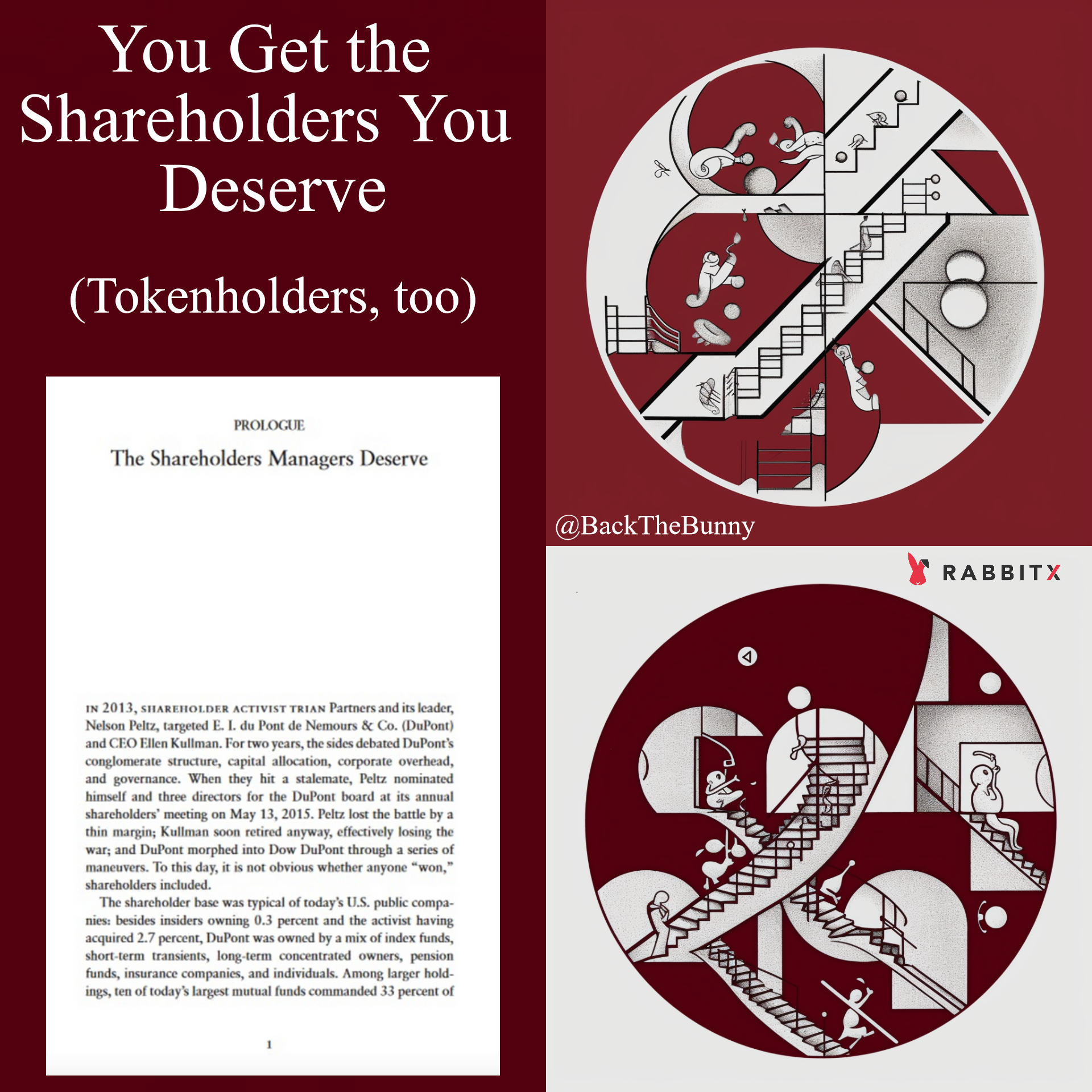One of my favorite pieces of wisdom: “Companies get the shareholders they deserve”. What management and the board emphasize and cater to is responsible for the type of person the company attracts as investors.
This applies equally to DeFi projects and their tokenholders.
If you run your business for the long-term, you attract long-term thinkers. If you run it for quarter-over-quarter (QoQ) metrics and hyped forward guidance… you attract short-term speculators.
Companies attract the shareholders they deserve via their priorities, which is a de facto form of signalling. You should want an investor base with similar time horizons as you, and with similar views on what's important for success.
It's critical these be aligned.

Is your focus on the stock doing well by overspending to juice revenue growth? Or is it growing the operating cashflow over the next 10 years? Because you will attract very different shareholders based on this.
DeFi projects do the same via their communication, airdrops, and roadmap. Tokenholders should align with the health of the project. If you speak to mercenaries and airdrop farmers but want to build for long-term users, you will have an unpleasant time-frame conflict to deal with.
There are 2 forms of “The Shareholders You Deserve”:
- The lifecycle of the company: Depending on the stage of development, the company attracts investors with different expectations and risk temperaments. Management has little control over this.
- The capital allocation and messaging of the company: Management has direct control over this. Your financial reporting, operations, and capital decisions have explicit and implicit communication about company priorities and focus. This is how you earn the shareholders you deserve.
Is your company in the growth stage of its lifecycle? Then this means investors are not interested in earnings (net income). Don’t talk about P/E to SaaS growthbros. P/E is a meaningless metric for valuing growth companies because management is not managing for the bottom line, they’re managing for revenue (top line). The accounting, spending, and earnings communication will all speak to this.
Management intentionally eschews net income in favor of aggressive marketing, sales, and R&D in this phase. To be losing money is fine, as the goal is rapid expansion. Once that’s achieved, then spend decreases, cashflows and earnings start to matter more, maybe you pay a dividend, etc..
The psychological profile of someone who invests in Cloudflare is very different from the one who invests in Walmart. The Cloudflare investor is much further out on the risk curve and expects very different performance than the Walmart one. Cloudflare gets judged on P/S, recurring revenue, gross margin expansion, etc.. Walmart gets judged on cashflows, net income, and maintaining its dividend. One wants stability and predictability, the other seeks huge growth. One may make you rich, the other will preserve your money.
GETTING THE SHAREHOLDERS YOU DESERVE
Sometimes the stock itself is part of what gives you the shareholders you deserve. The nuances of what management does sets expectations for the stock. Which impacts who wants to own it.
Remember the stock splits $TSLA did? There is zero financial rationale to do a stock split. Every single valuation metric stays exactly the same whether you have 1 million shares or 10 billion. Your market cap, P/E, P/S, EV/EBITDA, etc.. all completely unchanged.
Imagine taking a pizza and instead of cutting it into 8ths you cut it into 64ths. Those who think they now have more pizza are no different from those who think the value of stock has changed because of a stock split.
BUT you often see the stock pump on the news. Part of what you’re seeing is the psychological impact and anticipation of attracting a different kind of shareholder. Your stock becomes more accessible to retail at $50/share than $500. Your base has expanded… but at what potential cost?
If it's a split for the sake of a split, you're signalling an emphasis on traders and short-term capital. Smaller investors are more myopic. You’re appealing less to fundamentals and more to pumpamentals.
How you manage your company will be influenced by these new constituents. When management attracts less-sophisticated capital, they've taken actions to warrant this. Be aware of the signalling that people pick up on when you broadcast decisions.
No single action is responsible for it, it's cumulative. It’s a series of choices that communicates management’s focus. This applies to most human behavior tbh. It's not just a business thing. You can pick up on anyone's priorities this way.
Do you know why Warren Buffett has never split the Class A Berkshire shares? Last seen trading at $500k per share. Because a day trader doesn’t buy a six-figure stock. An investor does.

Buffett caters to investors. He does not make decisions on day-to-day movements or quarterly earnings fluctuations. He is a pronounced example of someone who manages for decades-long business decisions, and he has structured Berkshire to be intentionally offputting to short-term capital.
Focusing on long-term performance figures, conservative accounting, etc. attracts someone who is concerned with the health and stability of your business. You will appeal to true investors and their telescopic expectations depending on what you emphasize. DeFi leaders take note

THE TOKENHOLDERS YOU DESERVE
I want to make a very important technical and functional distinction: tokens are not stocks. Tokenholders are not shareholders. This is a key delineation because tokens are very much NOT securities.
You do not have a junior claim on company assets in bankruptcy with a token (you do with stock). You don’t have legal ownership with a token. Tokens are not equity, and they are not solely reliant on DeFi leaders for value. I’ve discussed previously why the word “solely” is important in respect to the Howey Test.
Example: no doubt oil is in-part valuable because companies extract it from the ground, but it does not solely derive its value from this. Oil has its much of its value derived from the utility it provides you as a commodity.
Good tokens have commodity-type use cases. RabbitX’s token $RBX will be a utility token. It will get its value from use of the RabbitX platform, and it uniquely allows you to contribute to the health of it when you stake it (soon). You cannot do this with stock.
APPL is not incorporated into Apple’s business model in a way that helps its business operations. You cannot do anything with AAPL stock besides hold it and hope Tim Cook and Co. do a good job (”solely from the efforts of others” applies here). The more utility a token has, the more it exists on the commodity spectrum.
I just want to emphasize this important distinction, so as to avoid any “ackshuallys” in case someone mistakenly thinks I’m calling tokens securities with this parallel. I’m not.
The shareholder analogy applies because tokenholders can influence a project. They're simultaneously users, community members, contributors, and investors. DeFi has created a new class of economic participation that we’re all grateful for.
Tokenholders are loud. They are rowdy. They’re swamptaint69 and 0xfilthbucket, and they have needs and expectations and you are going to hear about them. And feedback from tokenholders is valuable! But it’s only valuable if the feedback is from holders who are aligned with the project’s goals.
RabbitX recently did an airdrop. It was deliberately structured to be offputting to airdrop farmers. We designed it to holistically consider trading volume, PnL, duration of deposit, and OI. These parameters were useful guides for sorting authentic traders vs mercenaries. Airdrop farmers almost certainly failed on several of these metrics, since they're not real traders.
We don’t want people who only use the platform if we’re paying them to.
We don’t want a sugar-high of volume that makes us the hot girl for a couple weeks, then we’re dumped for the next smokeshow with a shorter skirt. The CAC isn’t economical. The model isn't sustainable. We're trying to cultivate the tokenholders we deserve.
If you pay someone to like you, no one actually likes you. We want to toe a line of incentivizing and rewarding genuine traders with airdrops, while putting in very blatant hurdles that repel mercenaries. We're a bad choice if your objective is to extract value then leave.
Of note: we’re continuing to refine how to effectively do this while showing Rabbit traders how much we value them. Our first airdrop was on the small side, and we received a lot of useful (and sometimes grumpy) feedback. It was appreciated and something we needed to hear.
We're listening to those who genuinely trade with us and always want to know how we can improve. We will improve. Doing this consistently will pay dividends via quality tokenholders and a quality community.
If you're a trader, we hope we will deserve you as a user and tokenholder. We are trying to earn you with our platform, actions, and value we provide. Hopefully the tokenholders we deserve are good ones 🤝
Follow @BackTheBunny


